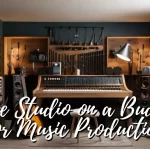Networking for Musicians: Building Meaningful Connections in the Industry
In the dynamic world of music, talent alone isn’t always enough to propel an artist or musicians to stardom. In an industry where relationships and connections often pave the path to success, mastering the art of networking is essential for musicians looking to make their mark. Whether you’re an aspiring artist, a seasoned musician, or somewhere in between, cultivating meaningful connections can open doors, create opportunities, and elevate your career to new heights. In this comprehensive guide, we’ll delve into the intricacies of networking for musicians, exploring strategies, tips, and real-world examples to help you forge lasting relationships and thrive in the competitive landscape of the music industry.
Understanding the Power of Networking: Cultivating Connections in the Music Industry
At its essence, networking transcends mere transactions—it’s about forging genuine relationships grounded in shared passions and mutual respect. For musicians, networking serves as more than just a means to an end; it’s a gateway to a world of opportunities and possibilities. Here’s a deeper exploration of why networking is a vital component of success in the music industry:
Unlocking Opportunities:
Networking opens doors to a myriad of opportunities that may otherwise remain elusive. Whether it’s securing gigs, collaborations, or endorsements, the connections forged through networking can be instrumental in propelling your music career forward.
Navigating Industry Insights:
The music industry is ever-evolving, with trends, technologies, and best practices constantly in flux. By engaging with peers and industry professionals through networking, musicians gain access to valuable insights and insider knowledge that can inform their career decisions and strategies.
Mentorship and Guidance:
Seasoned professionals within your network can serve as invaluable mentors, offering guidance, advice, and wisdom gleaned from their own experiences in the industry. Mentorship relationships forged through networking can provide invaluable support and direction as you navigate the ups and downs of a music career.
Building Collaborative Partnerships:
Collaboration lies at the heart of music-making, and networking provides the platform to connect with like-minded artists and creators. By collaborating with peers within your network, musicians can pool their talents and resources to create innovative and impactful work that resonates with audiences.
Access to Resources and Support:
Whether it’s access to studio time, equipment, or promotional opportunities, networking can connect musicians with the resources and support they need to bring their creative visions to life. From crowdfunding campaigns to shared studio spaces, the collective power of a supportive network can help musicians overcome obstacles and achieve their goals.
Staying Inspired and Motivated:
The music industry can be challenging and competitive, and it’s easy for musicians to feel isolated or discouraged at times. Networking provides a sense of community and camaraderie, offering encouragement, inspiration, and solidarity during both the highs and lows of a music career.
Fostering Long-Term Success:
In an industry where relationships are often the key to success, networking lays the foundation for long-term growth and sustainability. By investing time and effort into cultivating meaningful connections, musicians can build a robust support system that sustains them throughout their careers.
Building Your Network: Strategies and Tips
Building a robust network doesn’t happen overnight—it requires time, effort, and genuine engagement. Here are some strategies and tips to help you expand your network and build meaningful connections in the music industry:
Attend Industry Events:
From music festivals and conferences to industry mixers and networking events, make it a priority to attend gatherings where musicians, industry professionals, and music enthusiasts converge. These events provide invaluable opportunities to meet new people, exchange ideas, and showcase your talent.
Utilize Social Media:
In today’s digital age, social media platforms like Instagram, Twitter, and LinkedIn offer powerful tools for networking. Use these platforms to connect with fellow musicians, industry professionals, and fans, and to share your music and insights with a wider audience.
Collaborate with Peers:
Collaboration is key to building strong relationships in the music industry. Seek out opportunities to collaborate with other musicians, producers, and songwriters, both within and outside your genre. Collaborative projects not only allow you to showcase your skills but also introduce you to new audiences and potential collaborators.
Seek Mentorship:
Don’t be afraid to seek mentorship from more experienced musicians or industry professionals. Whether it’s receiving feedback on your music, gaining career advice, or learning about the ins and outs of the industry, having a mentor can provide invaluable guidance and support as you navigate your musical journey.
Be Genuine and Authentic:
Authenticity is key to building meaningful connections in the music industry. Be genuine in your interactions, and approach networking with sincerity and humility. Show genuine interest in others’ work, and be willing to offer support and assistance whenever possible.
Real-World Examples: Networking Success Stories
In the competitive world of music, networking can be the difference between obscurity and success. Here are some real-world examples of musicians who leveraged the power of networking to achieve their goals:
Arijit Singh:
Renowned playback singer Arijit Singh rose to prominence in the Bollywood music industry through a combination of talent and strategic networking. By forging relationships with composers, lyricists, and music directors, Arijit positioned himself as one of Bollywood’s most sought-after playback singers, lending his soulful voice to numerous hit songs.
Prateek Kuhad:
Indie singer-songwriter Prateek Kuhad gained international acclaim through his heartfelt lyrics and melodic tunes. By actively engaging with fans and industry professionals on social media, as well as participating in music festivals and industry events, Prateek built a dedicated fan base and established himself as a prominent figure in the indie music scene.
AR Rahman:
Composer AR Rahman, often hailed as the Mozart of Madras, is a testament to the power of networking in the music industry. Through his collaborations with filmmakers, musicians, and artists from around the world, Rahman has transcended boundaries and achieved global recognition for his pioneering work in Indian music.
Conclusion
In the ever-evolving landscape of the music industry, networking remains a cornerstone of success for musicians at every stage of their careers. By cultivating meaningful connections, fostering collaborations, and engaging with industry peers, musicians can unlock a world of opportunities and propel their careers to new heights. Whether you’re a budding artist looking to break into the industry or a seasoned musician seeking new avenues for growth, mastering the art of networking can be the catalyst that transforms your musical aspirations into reality. So, embrace the power of networking, and watch as your musical journey unfolds in ways you never thought possible.


